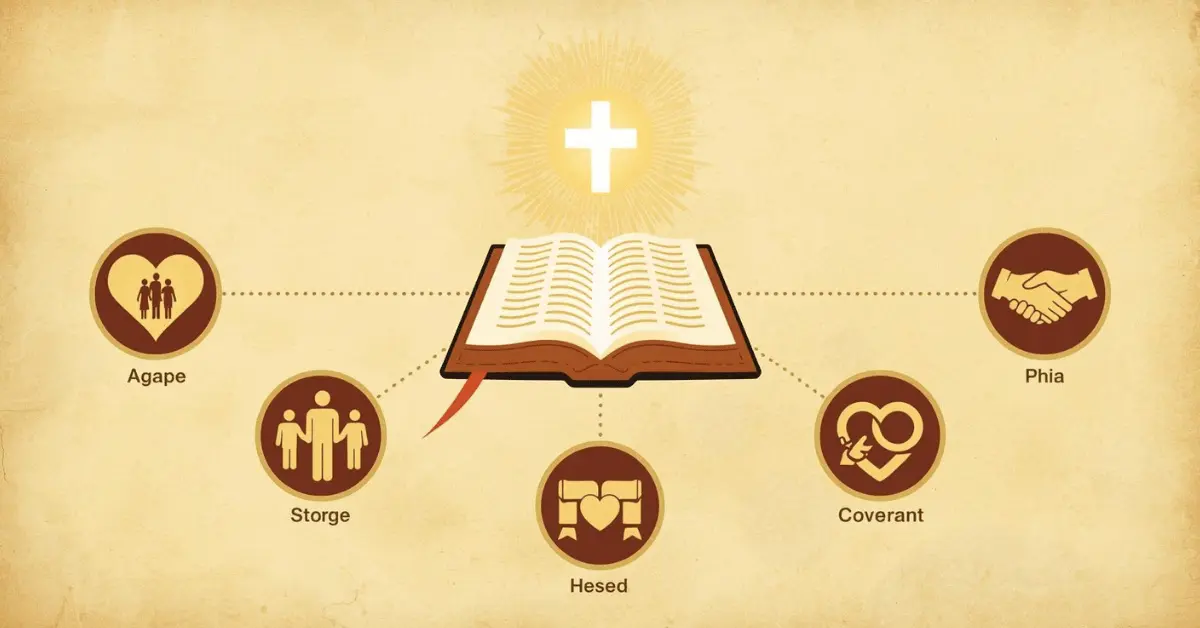The Bible speaks extensively about love, describing it not only as an emotion but as a divine command and a reflection of God’s nature. In fact, Scripture teaches that “God is love” (1 John 4:8), highlighting its central role in Christian life.
For Christians, understanding these distinctions provides richer insight into God’s Word and helps us apply biblical principles to our daily relationships — with God, family, friends, and even strangers.
Love as the Foundation of Faith
Before diving into the different types, it’s important to recognize that love is the cornerstone of the Christian faith. Jesus declared that the greatest commandments are to love God with all our heart, soul, and mind, and to love our neighbour as ourselves (Matthew 22:37–39). These words reveal that love is not secondary — it is the very essence of God’s law.
💡 When believers embrace love as the foundation, their prayers, service, and obedience become acts of worship motivated by devotion rather than duty. Love transforms faith from routine religion into a living relationship with God and others.
1. Agape – God’s Unconditional Love
Agape is the highest form of love in Scripture. It refers to God’s unconditional, sacrificial, and selfless love for humanity. Unlike human affection, agape is not based on feelings or merit — it flows directly from God’s nature.
Living Out Agape as a Christian
Jesus displayed agape on the cross, offering salvation freely to all who believe. Christians are called to mirror this love by forgiving others, serving without seeking reward, and extending kindness even to those who oppose them. Agape love challenges believers to rise above selfishness and reflect Christ’s heart in their daily lives.
2. Storge – Familial Affection
Storge describes the natural affection and bond found within families. Though the Greek word itself doesn’t frequently appear in Scripture, its presence is seen in stories like Jacob’s love for Joseph (Genesis 37:3) or Mary’s care for Jesus.
Importance of Storge in Christian Life
Family love is central to God’s design for humanity. Strong relationships at home — marked by patience, forgiveness, and support — provide the foundation for healthy community life. Christians are encouraged to cultivate storge by valuing family unity, nurturing children in the faith, and modelling Christlike love at home.
3. Philia – Brotherly Friendship
Philia represents brotherly love and deep friendship. This type of love is rooted in loyalty, trust, and shared values. The Bible illustrates philia in the profound friendship between David and Jonathan (1 Samuel 18:1–3), as well as in the close bond Jesus had with His disciples.
Strengthening Christian Fellowship Through Philia
Christian community thrives on philia. Believers are urged to “love one another with brotherly affection” (Romans 12:10). Genuine friendships within the church provide encouragement, accountability, and joy. Philia reminds us that faith is not lived in isolation but within supportive relationships that strengthen our walk with God.
4. Eros – Romantic Love
Eros refers to romantic and passionate love, typically expressed between husband and wife. While the Greek word itself isn’t used in the New Testament, the concept is beautifully portrayed in the Song of Solomon, which celebrates marital intimacy and devotion.
A Biblical View of Eros in Marriage
God created eros as a gift to be enjoyed within the covenant of marriage. When guided by purity and commitment, romantic love strengthens the marital bond and brings joy to both partners. Far from being sinful, eros reflects God’s design for intimacy, unity, and the continuation of family.
5. Hesed – Covenant Faithfulness
In the Old Testament, the Hebrew word hesed conveys loyal, steadfast, and covenantal love. Often translated as “loving-kindness” or “faithful love,” it describes God’s unchanging commitment to His people. Despite Israel’s unfaithfulness, God’s hesed endured (Psalm 136 repeats, “His love endures forever”).
Why Hesed Matters for Christians
For believers, hesed highlights God’s reliability and mercy. His promises remain true regardless of our failures. Christians are called to embody hesed in their relationships by demonstrating loyalty, keeping commitments, and showing mercy. Just as God’s love never fails, our love should strive to reflect the same faithfulness.
The Deeper Message of Biblical Love
While each type of love has its unique expression, all point back to God as the ultimate source of love. Understanding these biblical categories helps Christians practice love in a fuller way — not reducing it to just romance or emotion but embracing it as a divine calling.
🌟 When believers embody agape, storge, philia, eros, and hesed, they reflect God’s heart to the world, showing that love is more than a feeling — it is a lifestyle of faith, sacrifice, and covenant.
Love as a Witness to the World
Love is not only for personal growth — it is also a testimony to others. Jesus said, “By this everyone will know that you are my disciples, if you love one another” (John 13:35). This means that love is the distinguishing mark of true Christian faith.
🌍 When believers demonstrate Christlike love — forgiving freely, serving generously, and standing in loyalty — they display God’s character to a watching world. Love becomes the bridge that draws people closer to the gospel, often speaking louder than words.
Conclusion
The Bible’s teaching on love is both profound and practical. By exploring the five types of love — agape, storge, philia, eros, and hesed — Christians gain wisdom for nurturing relationships, strengthening faith, and living out the command to “love one another.”
True love, in all its forms, begins with God. As believers draw closer to Him, they are empowered to love others more deeply and authentically.
👉 For deeper study on biblical love, you can explore trusted resources such as Bible Gateway, which provides access to different translations and commentaries.

